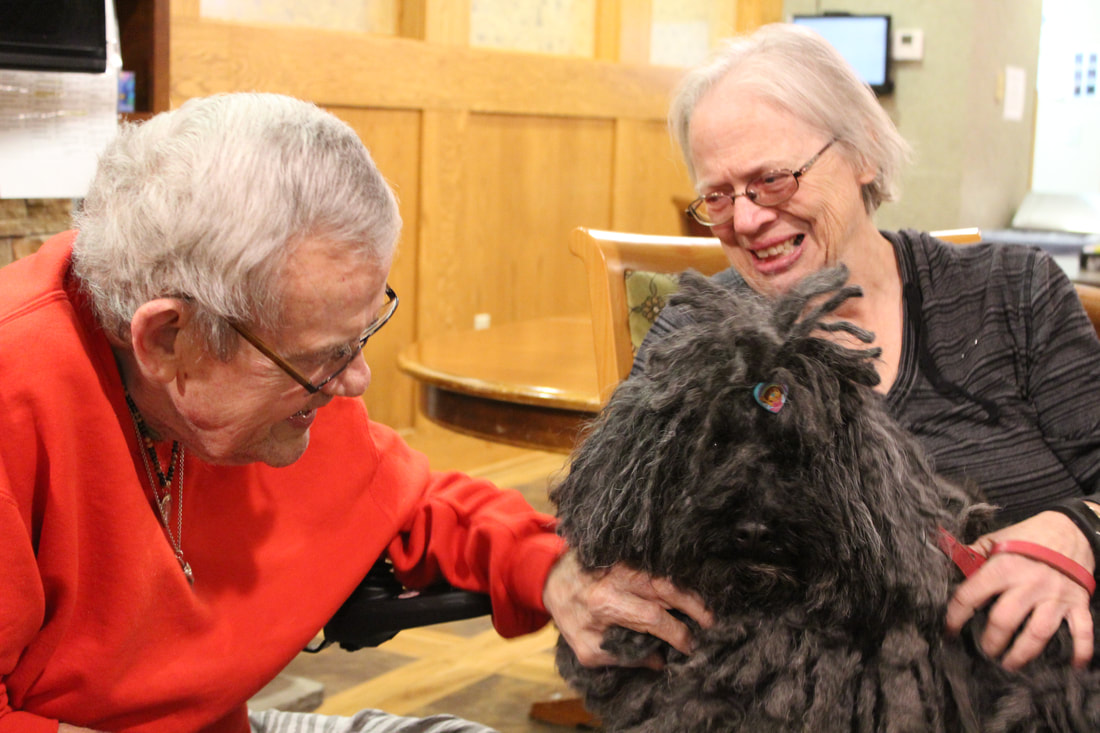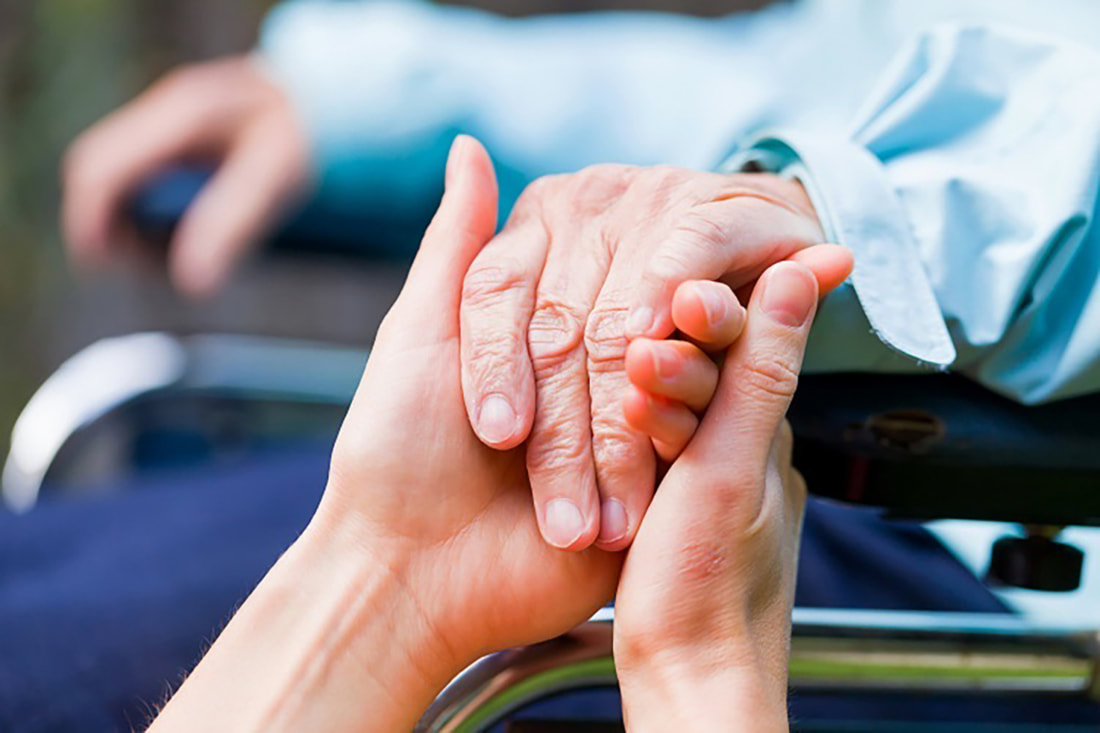|
Therapy Animals Bring Lasting Comfort
It only takes a few minutes with Renee Beymer and her Puli dogs, Sari and Anika, to see the unique care animal visitors provide to residents. Like the interaction above with Renee, Sari and resident, Mike. Renee and her dogs are members of Tailwaggers—a large group of therapy animal visitors who have been faithfully coming to our campus for more than a decade! Renee was first introduced to therapy animals when her own mother was sick in the hospital. Renee knew then that this was something she would do with her own dogs in retirement. She is reminded often that being a therapy dog is a special calling. "The dogs have such a sense of what they are doing," Renee explains. “Anika is not a kisser at home. But as soon as she is in a care setting she lets residents hold her hand. Both Sari and Anika love to serve.” A therapy animal is trained as a team--the animal and the person handler. “It’s more than just expecting your dog to be obedient. The person handler is an advocate for their dog and puts them in situations to be successful,” she notes. Take an elevator ride. Renee might appear to be simply riding and chatting with another rider. But she is also assessing if the other person is comfortable around an animal and watching to protect her dog's feet as others get off and on. And like Sari and Anika, Renee loves this work. “I see there is such a need. It allows folks to reminisce about special animal friends from the past. It’s been a real joy for me.”
1 Comment
Music is such a powerful force that affects people of all ages: learning the ABCs as a kid, attending your first concert or choosing the song to dance to at your wedding. Classic songs can bring back specific memories for a person who is dealing with dementia. Listening to music or playing an instrument has many benefits for dementia patients in all stages of this disease.
Music Brings Back Memories
Music ignites powerful emotions, which can bring back memories for some dementia patients. When these patients hear songs from their era, each specific song can remind them of different experiences- their wedding dance, the day their first child was born, a family road trip, etc.
Music Can Shift the Mood from Negative to Positive
There have been so many stories of how dementia patients can start the day with a bad mood, but when music from the “good old days” starts to play, they are taken back to a joyful and fun time in life. Consequently, this music that shaped their young lives can give them a positive attitude in their later years.
Music Boosts Brain Activity
The part of our brains that is stimulated when we hear music that we love is called the “salience network” and this section of our brains is rarely affected by dementia and mental illness. There are numerous examples of people whose brain activity increased when listening to music- like the man who started to communicate again after listening to songs.
Music Can Be Used as a Communication Tool with Dementia Patients
Research has shown that both visual and language memory are the first to suffer in this disease, but using music to communicate with patients can activate their brain. Caretakers can pair music with day-to-day activities so that patients can more easily develop a pattern that assists them in remembering the activity that they were doing while listening to a certain song.
Music Reduces Anxiety in Dementia Patients
Dementia patients can become easily frustrated and anxious when they can’t complete a chore or activity that they used to be able to accomplish. Putting on music, having patients dance to songs or play instruments relieves stress and can improve eye contact, engagement, etc.
As a part of our Lifelong Learning Program, we partner with MacPhail Music for Life, Northern Clay and the Bloomington Art Center to provide unique music and art therapy for our residents. Our Lifelong Learning Program promotes continued learning, encourages exploration of residents’ talents, and furthers creative expression. References: https://www.alzheimers.net/why-music-boosts-brain-activity-in-dementia-patients/ https://newatlas.com/music-may-help-cure-dementia/54420/ https://www.alzheimers.net/2013-06-04/music-therapy-for-dementia/ https://medicalxpress.com/news/2018-11-music-mood-adults-dementia.html
Martin Luther Campus is part of the Ebenezer family of Lutheran Senior Care Communities. We provide transitional care and assisted living apartments for seniors in Bloomington. We also have adult day clubs and memory care programs for seniors living at home. We’re located at 1401 East 100th St. Bloomington, MN. Are you interested in transitioning to assisted living or do you have a loved one that needs assisted living? Call us at 952.888.7751
Spending time with a loved one suffering from Alzheimer’s can be challenging. Activities that once brought them joy they no longer have interest in. They may be confused easily or unresponsive. Don’t give up – there are still many family activities you can do with seniors dealing with Alzheimer’s. The key is to take it slow and focus on bonding. Reminiscing This activity is an excellent way for elders to improve self-understanding. Try to keep reminiscing activities safe and remember to stop if your loved one recalls painful memories or becomes agitated. Try watching family videos or looking through photo albums. You can also watch a favorite movie or TV show from your loved one’s past. MusicResearchers have found that adults with advanced Alzheimer’s still respond to music. Listening to songs together is a fun way to connect with your loved one. Choose songs from their past to sing and dance to, or just sit and listen to together. Arts & CraftsArts and crafts can help stimulate the brain. Remember to simplify crafts so your loved one doesn’t become frustrated. Playing with clay is a fun, textile craft. Painting, coloring, knitting and stringing are all crafts that can be easily simplified. Clean TogetherChores may not sound like a fun activity on paper, but for someone with Alzheimer’s the routine of doing once-familiar tasks is extremely beneficial. Simple tasks like wiping off the table, sweeping or holding a trash bag gives your loved one a way to be part of a team and feel accomplished. Read TogetherReading is an important bonding activity. Pick a newspaper or book with large print. You can take turns or read to your loved one and ask them their thoughts on what you’re reading. Cook TogetherNot only is cooking fun, but you get the bonus of a tasty treat. Cooking can also easily be adapted for the ability level of your loved one. Choose a simple recipe and put them in charge or assign them an easy, repetitive task (like stirring). Cooking also goes hand-in-hand with reminiscing: start a discussion on their favorite foods growing up. ExerciseExercise is good for both you and your loved one. Pick low-impact, low-energy activities. Walking, swimming, yoga and tai chi are all great activities to do together. Garden TogetherGetting outside for some fresh air is important for people with Alzheimer’s. The basic, repetitive nature of gardening is easy to follow. If your loved one isn’t up for gardening themselves, visit a botanical garden together. OrganizeOrganizational tasks stimulate the brain. Have your loved one help you sort items by function, color, shape or design. You can turn organization into a game by cutting up a favorite poem and having your loved one put it back in order. Sensory StimulationEven as Alzheimer’s becomes severe, your loved one still retains their senses. Sensory stimulation helps ground them. Try textile activities like combing hair, moisturizing their skin, shaving their face, giving them a manicure or having them interact with a textile like a soft teddy or moldable clay. Always remember: it’s more about the process and not the result. Completing an activity isn’t as important as the time spent together. Be patient with your loved one and if they seem resistant, take a break and try again later. Our caregivers work with your loved one to provide daily stimulation and brain-boosting activities. Our Memory Care Program at Martin Luther empowers our staff to provide compassionate and exceptional care based on current best-practices in memory care. Call Amy at 952-948-5167 for more information. Sources: https://www.goldencarers.com/reminiscing-activities-for-seniors/3184/ https://assets.aarp.org/external_sites/caregiving/homeCare/engaging_activities.html http://www.alzheimers.net/2014-03-06/stimulating-activities-for-alzheimers-patients/ http://dementiatoday.com/fun-things-to-do-with-alzheimers-patients/ Martin Luther Campus is part of the Ebenezer family of Lutheran Senior Care Communities. We provide transitional care and assisted living apartments for seniors in Bloomington. We also have adult day clubs and memory care programs for seniors living at home. We’re located at 1401 East 100th St. Bloomington, MN. Are you interested in transitioning to assisted living or do you have a loved one that needs assisted living? Call us at 952.888.7751.
|
Director of Community Relations
Hello friends, my name is Kate and I'd love to share with you ALL of the wonderful things happening at Martin Luther Campus. Be sure to check our Blog, Lifestyle page and Facebook page often to stay updated on the happenings at our community! Archives
November 2023
Categories |
|
telephone |
|
DIRECTIONSimap
|
© 2021 Fairview Health Services
|




 RSS Feed
RSS Feed

